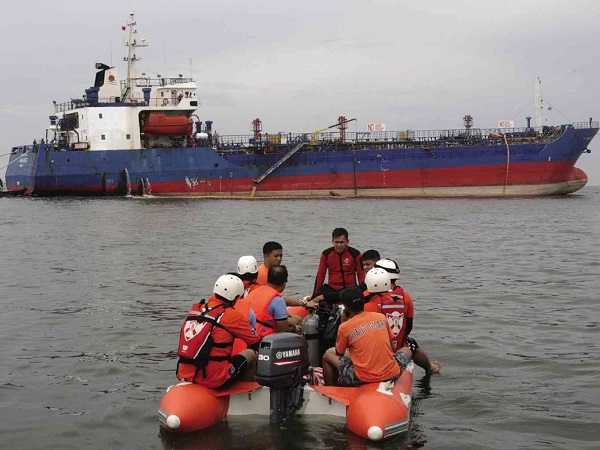Cavite gov downplays diesel spill destruction

CALAMITY IN CAVITE A Philippine Coast Guard team takes samples from waters off Rosario, Cavite province, on Friday to check for oil contamination after a spillover of 500,000 liters of diesel fuel on Manila Bay on Friday. The oil spill spread a large reddish stain over the bay, posing potential health and environmental hazards, authorities warned. NIÑO JESUS ORBETA
MANILA, Philippines—A diesel oil spill on Manila Bay that raises potential environmental and health hazards and threatens to ruin the capital’s vital fishing industry has “95-percent” evaporated, leaving only “a thin film” of fuel on the water’s surface, the governor of Cavite province claimed on Friday.
“There were no evident signs of a fishkill, no damage to properties, although we are still waiting for the results of marine tests,” said Cavite Gov. Juanito Victor Remulla following a visit to the spill site in the town of Rosario on Friday.
Remulla said an estimated 90,000 liters of diesel spilled into the water.
But based on the aerial survey conducted by the Philippine Coast Guard (PCG), an estimated 500,000 liters of diesel spilled into the waters off Cavite, affecting at least four towns in the province (Rosario, Naic, Tanza and Ternate), said Cmdr. Joel Garcia, head of the PCG marine environmental protection unit.
“That’s approximately 20 kilometers. If you measure the affected area going seaward or going toward the middle of Manila Bay, it’s more or less 15 kilometers,” he added.
Article continues after this advertisementWhether the oil spill will spread further to other areas depends on underwater currents and prevailing winds, he said, noting that the oil spill was heading towards Corregidor on Friday.
Article continues after this advertisement“I cannot say that we have contained it because it has affected so wide an area,” Garcia told reporters.
“There have been reports of cases of people going to the hospital from difficulty of breathing due to the fumes coming from this oil,” he said.
Oil containment booms have been deployed while government experts are checking the impact on marine life, he said.
Garcia said the PCG decided not to use the chemical dispersants, as they would poison the water, opting to let the fuel evaporate. He could not say how long that would take.
Suspected sources
He said divers were inspecting the hull of the MT Makisig, the oil tanker that is suspected to be the source of the leak.
Remulla said there were no ruptures seen on the flanges that connected the oil tanker to the submarine pipeline of Petron Corp., which operates a fuel depot in Rosario.
The tanker, which is now being held by the PCG, had docked at a Petron terminal in Rosario on Wednesday, unloading 2.3-million liters of diesel through an underwater pipeline.
The spill was first spotted about 3 kilometers off the coastline of Rosario on Thursday afternoon.
He said unlike the 2010 incident when bunker fuel leaked from a ruptured Petron pipeline, diesel “disperses or dilutes in water and later evaporates faster, unlike bunker fuel that clings to the seabed.”
Likely source
Pending the results of the investigation, Remulla said initial signs of the leak have led authorities to believe that the oil spill originated from the oil tanker, contrary to earlier reports by the PCG that a broken Petron pipeline caused the leak.
“No, not Petron,” he said, when asked to clarify the report. He said he had not spoken yet to the shipping company, although Petron is staying “on top of it.”
He said taking any legal action against whoever was liable for the oil spill should come later, as authorities were focusing on plugging the leak now and addressing the needs of the affected residents.
The governor said about 3,000 families dependent on fishing have been affected.
A report from the Regional Disaster Risk Reduction and Management Council (DRRMC) of Calabarzon (Cavite, Laguna, Batangas, Rizal and Quezon provinces) showed the number of affected villages in Cavite as nine in Rosario, 13 in Tanza and nine in Naic.
State of calamity
Disaster authorities in Calabarzon earlier said four coastal towns in Cavite had been affected by the spreading oil spill and that the livelihood of hundreds of fisherfolk was threatened.
The municipal council of Rosario declared a state of calamity yesterday after officials found that oil sludge had clung to and damaged the coral reefs in municipal waters.
DRRMC regional director Vicente Tomazar said they have been monitoring the spread of the spill that had already reached the coastal villages in the neighboring municipalities of Ternate and Tanza.
He said about 300 fisherfolk complained of finding oil sludge in their fish catch.
“It is now threatening the next town of Naic,” Tomazar said in phone interview on Friday.
The militant fisherfolk group Pambansang Lakas ng Kilusang Mamamalakaya ng Pilipinas (Pamalakaya), in a statement on Friday, revived its call to shut down the Petron depot in Rosario.
In 2010, an oil spill also hit the waters off Rosario after a submarine pipeline of Petron was damaged when hit by the anchor of a barge swept at the height of Typhoon “Basyang.”
Earlier Friday, the PCG said it had discovered a continuous leak from the underwater pipeline of Petron’s terminal in Cavite.
However, it could not say conclusively that the oil company was the one responsible for the oil spill.
“Based on the diving operation we conducted, there is a continuous leak coming from the Petron pipeline,” said Garcia.
“But right now, I do not want to speculate if it’s either the motor tanker Makisig, which is docked in the area, or Petron who is the one responsible for the oil spill. We want to complete our investigation first,” he said.
Garcia also said that samples of the oil spill taken from the affected shoreline, as well as the oil samples taken from the ship and Petron terminal, were found to be identical.
“They matched and that will form part of the evidence to determine who the culprit is,” he said.
He said the PCG will file obstruction of justice charges against the staff of Petron and the Makisig for initially refusing to cooperate in the investigation.
“They initially refused to give us samples of their product,” he said, though coast guard divers eventually managed to collect samples.
Once there is direct evidence, Garcia said those responsible for the oil spill will be charged based on the provisions of the Clean Water Act and Marine Pollution Law of the Philippines.
He said that approximately 20 kilometers of coastline had been affected.
Petron doing own probe
Petron, the country’s biggest oil company, on Friday said it was investigating the oil spill observed near the contractor vessel that loaded diesel at its Rosario depot on Friday.
“Petron observed traces of oily sheen near the vessel (the Makisig) of its third-party contractor which had just finished discharging diesel at its Rosario terminal in Cavite,” it said in a statement.
The company said it immediately deployed an “oil spill response team” to see the extent of the oily sheen and begin containment and recovery operations.
Tests at the oil firm’s Rosario depot for possible leaks revealed the receiving pipeline to be intact and without leaks, Petron said, suggesting the leak may have come from the vessel but said this will have to be investigated further.
Petron said later that it would look into the PCG’s report that divers found leaks in the company’s underwater pipeline.
As to fears about health and environmental threats, the company echoed Remulla, saying that diesel is not a persistent oil and that it disperses and evaporates quickly.
“There is no danger to the environment and the local community,” it said.
The company said it was conducting its own investigation to see how the spill happened and to prevent it happening again.
Health hazards
A Department of Health official on Friday warned residents of coastal towns in Cavite to take precautions.
Assistant Secretary Enrique Tayag said residents of affected areas should avoid swimming and wait for the Bureau of Fisheries and Aquatic Resources to determine if the fish is safe to eat.
“Those with asthma and other respiratory diseases should stay indoors. If they go swimming, they could ingest or their skin could absorb petroleum components which are corrosive from the solvents present,” Tayag said in an interview.
“There are also concerns about inhalation with the presence of benzene, which is a carcinogen. If inhaled, including ethyl benzene, toluene, and xylene, these can affect the central nervous system,” he added.
Tayag said residents should also avoid eating fish or shellfish contaminated with polyaromatic hydrocarbons, which are known carcinogenic.
Washed-up fuel
Energy Secretary Carlos Jericho Petilla warned people against buying washed-up fuel that some enterprising people have been selling.
“We have received reports that some people are collecting the fuel washed up toward the shore and selling these diluted products in what is known as ‘bote-bote.’ This is illegal and we advise motorists to avoid buying products that are not from the pump. These bote-bote products contain seawater and will damage vehicle engines,” Petilla said in a phone interview. With reports from Riza Olchondra and Philip Tubeza
Related Stories:
Leaking Petron pipeline caused oil spill—Coast Guard
Oil spill samples match tanker’s fuel, says PCG
